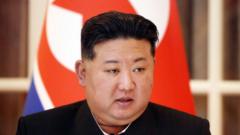The U.S. suspends critical exports, raising trade conflict stakes with China over tech and resources.
U.S. Halts Key Exports to China Amid Rising Trade Tensions

U.S. Halts Key Exports to China Amid Rising Trade Tensions
Trump Administration takes action against China, halting sales of essential technologies
The Trump administration has made a significant move by halting exports of essential U.S. technologies to China, including those related to jet engines, semiconductors, and certain chemicals. This decision responds directly to recent Chinese restrictions on exports of critical minerals to the U.S., creating tension in global supply chains and prompting concerns over potential supply chain warfare.
U.S. officials are signaling that both Washington and Beijing are attempting to leverage their economic power amidst escalating trade disputes. The ramifications of this new restriction could have far-reaching effects on American companies reliant on foreign technologies, especially those involved in aviation, robotics, and automotive production.
This latest development adds complexity to negotiations following a recent agreement to reduce tariffs for 90 days as both nations sought a longer-term resolution. Treasury Secretary Scott Bessent previously indicated that both sides were intent on avoiding economic separation. However, the administration's actions continue to target China with a variety of punitive measures.
In an announcement made Wednesday, Secretary of State Marco Rubio further escalated the situation by stating that the U.S. would “aggressively revoke” visas for Chinese students who are studying in critical fields or maintaining ties with the Chinese Communist Party. While U.S. officials had anticipated a relaxation of China's restrictions on vital mineral exports following the tariff agreement, there appears to be a growing dissatisfaction with China's responses thus far as tensions continue to rise.
U.S. officials are signaling that both Washington and Beijing are attempting to leverage their economic power amidst escalating trade disputes. The ramifications of this new restriction could have far-reaching effects on American companies reliant on foreign technologies, especially those involved in aviation, robotics, and automotive production.
This latest development adds complexity to negotiations following a recent agreement to reduce tariffs for 90 days as both nations sought a longer-term resolution. Treasury Secretary Scott Bessent previously indicated that both sides were intent on avoiding economic separation. However, the administration's actions continue to target China with a variety of punitive measures.
In an announcement made Wednesday, Secretary of State Marco Rubio further escalated the situation by stating that the U.S. would “aggressively revoke” visas for Chinese students who are studying in critical fields or maintaining ties with the Chinese Communist Party. While U.S. officials had anticipated a relaxation of China's restrictions on vital mineral exports following the tariff agreement, there appears to be a growing dissatisfaction with China's responses thus far as tensions continue to rise.























